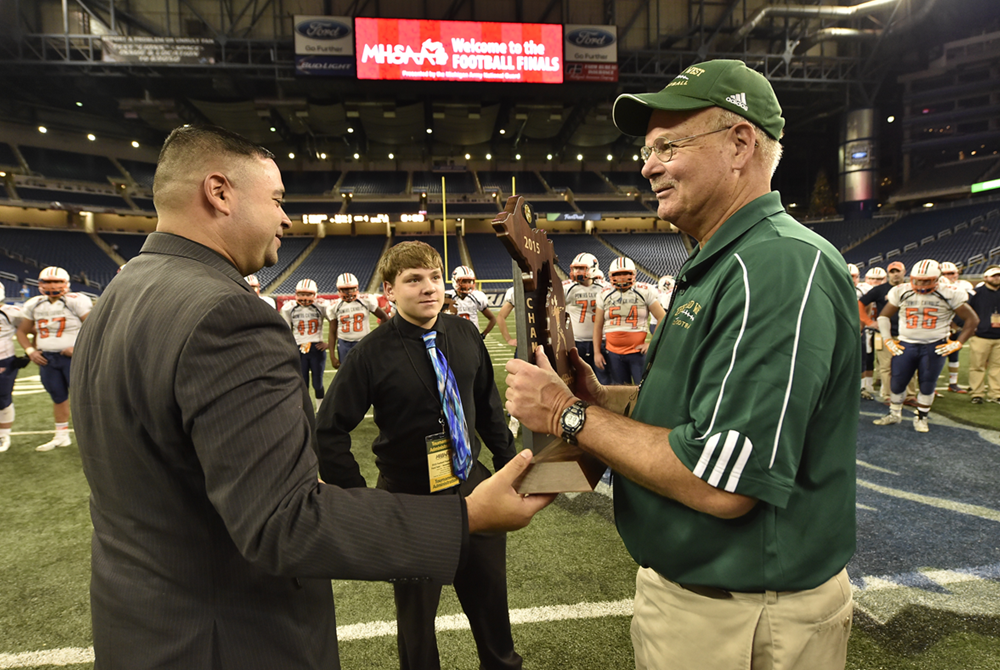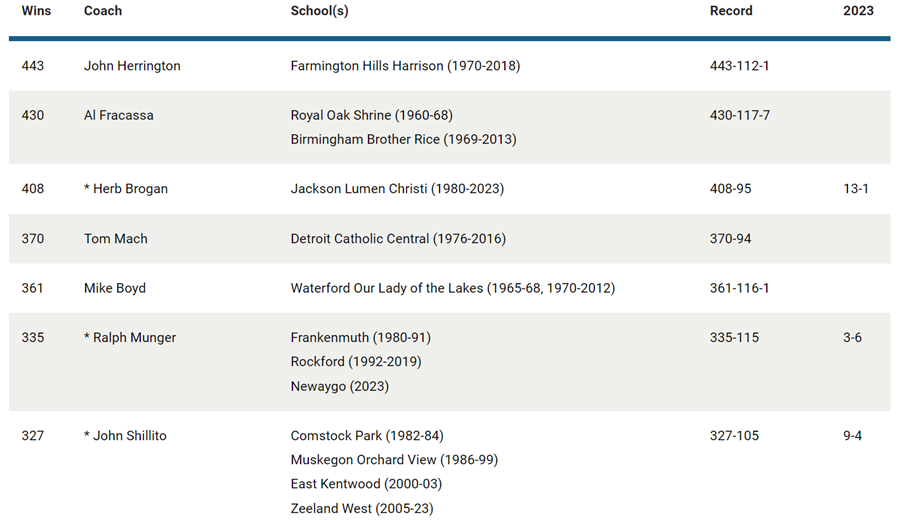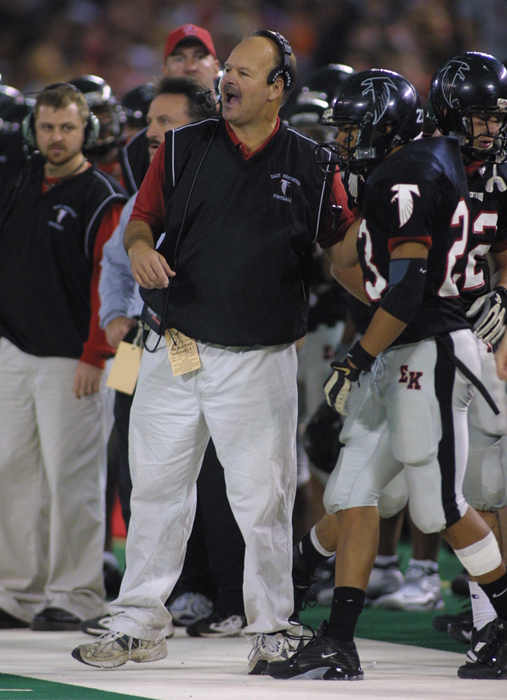
Task Force Building Multi-Sport Message
November 11, 2016
By Geoff Kimmerly
Second Half editor
Walled Lake Western’s Cody White draws his perspective on high school sports from a background that, while perhaps not unique, has to be close.
The Warriors senior is one of the top college football prospects in Michigan, a Big Ten-caliber player who has committed to continue his career at Michigan State University after he graduates in the spring.
Our state has a handful of athletes like that every year, of course. But White also is the son of former NFL player and Detroit Lions executive Sheldon White – and has followed his father’s Dayton, Ohio, footsteps in playing three sports during his high school career.
White plays football, basketball during the winter and baseball in the spring, in addition to travel basketball and baseball during the summer. He has played these same sports throughout high school. His freshman year he also competed in track & field, along with baseball. As of May – when White and his multi-sport experience were featured on Second Half – he hadn’t ruled out returning to track & field, in addition to baseball, as a senior.
“I couldn’t see myself not competing in those sports,” White said at the time. “I love them so much. I want to finish my senior year playing all three.”
It’s White’s experience, and the benefits enjoyed by so many who have shunned the recent trend toward specialization, that is driving the MHSAA’s Multi-Sport Task Force as it aims to promote the value of a varied sports experience through high school, even for athletes considered “elite” in a sport they’ll go on to play at higher levels.
The Multi-Sport Task Force met for the third time Oct. 27 and includes coaches, administrators and teachers with diverse experiences in athletics at schools large and small; urban, suburban and rural and in both the interscholastic and club settings.
The idea of moving away from specialization and back toward playing multiple sports has gained steam in recent years with pronouncements of how doing so paid off for nationally-recognized stars like professional golfer Jordan Spieth, baseball Hall of Famer John Smoltz and a number of members of the U.S. women’s soccer national team who played multiple sports through high school.
The MHSAA’s task force is working to develop that message, package it in the most digestible formats, and deliver it to the key decision-makers to benefit athletes at the age where the message can have the heaviest impact on their sports careers and growth into physically fit adults.
“This is a fundamental topic in school sports,” MHSAA Executive Director Jack Roberts told the task force during its most recent meeting. “This is something we’ll be talking about five and 10 years from now.”
The task force is charged with a series of goals that will be discussed below and are still in development. But there’s no doubt coaches will play a significant part in promoting and carrying out this important mission.
“Growing up was a little different (for me) than the usual kid. Going to Lions games and just being around football all the time. I think I love the game more because I was around it so much. But I think playing three sports helped me, too. The twisting of your hips in baseball, when you swing the bat, you’re using different muscles. And all the jumping you do in basketball. You have to move in tight spaces. With football, you’re with the football guys. By doing all three you meet different people.” – Cody White, “Western’s White Enjoys ‘Special’ Career” – May 4, 2016
What we’ve learned
The task force’s first meeting in April included discussions with Dr. Tony Moreno of Eastern Michigan University, a frequent Coaches Advancement Program instructor, and Dr. Brooke Lemmon of the MSU Sports Medicine Clinic. Among points from their focus on medical issues that result from specialization:
• Specialization has chronic, long-term affects; young people who do not learn physical literacy – how to solve movement problems – are less likely to be physically active and, hence, less likely to be physically fit. This is becoming an expensive health issue for society.
• The loss of physical education from schools is the root of these problems and has led to the creation of “privatized PE” for those who can afford a club sports experience. Physical education in schools, done correctly, can create a relatively noncompetitive environment that increases student interest in becoming physically active.
• More time spent in one activity will lead to more injuries, especially of the chronic nature. The number of hours per week a child spends on one sport activity shouldn’t exceed that child’s age (8 hours per week for an 8-year-old, for example).
Dr. Dan Gould, the director of the MSU Institute for the Study of Youth Sports, talked to the task force during its second meeting about how children perceive sports – and the need to adjust parents’ expectations for their kids’ success. He explained how kids can lose their identity focusing on just one sport, and also the importance of free play – the games kids make up themselves while playing in a structure-free environment.
Bob Mancini of USA Hockey visited with the task force most recently, explaining how his was the first governing body to tell athletes it wanted them to play their sport – but in order to do so well, play other sports also. USA Hockey’s American Development Model was launched in 2009 to in part promote multi-sport participation – and is growing hockey in the process, with increased participation seen at youth levels over the last three years.
“It’s just really fun to do different things. We don’t have a lot of the numbers, but we have the people who are willing to put in the hard work, even if it’s not their best sport. Each season is only three to four months at the most. So it keeps things exciting.”— 2016 Bronson graduate Kelsey Robinson, a defensive specialist in volleyball, former cross country runner, guard in basketball and a third baseman and centerfielder in softball, “Multi-Sport Experience ‘Special’ for Bronson” – February 2, 2016
Questions & Answers
The task force will meet again Feb. 8, and in the meantime there are a number of questions – and answers – to be considered.
The group has pinpointed a series of goals:
1. Partner with groups promoting diverse physical activity.
2. Encourage those promoting more and better physical education.
3. Prepare tools for administrators for use in interviewing prospective coaches, conducting meetings with their coaching staffs and encouraging them to “walk the talk” of balanced participation.
4. Assist in the explanation of the multi-sport experience to parents through a variety of media, including a guidebook and video explaining its benefits.
Carrying out these aspirations comes with plenty to discuss.
Who most needs to hear the message of multi-sport participation? It’s most likely junior high and middle school parents, or even those of elementary students just starting to experience organized athletics.
 What do these parents and children most need to know? Parents are stakeholders in their children’s athletic ventures. The challenge is convincing them our way is best for their kids’ futures, from a health and development standpoint.
What do these parents and children most need to know? Parents are stakeholders in their children’s athletic ventures. The challenge is convincing them our way is best for their kids’ futures, from a health and development standpoint.
Who should deliver this message? Celebrities obviously carry clout when they talk about how their multi-sport experiences led them to become successful adults. But there also could be a strong emotional tug from current student-athletes who tell their stories.
How can coaches and athletic directors help spread the word? The MHSAA, with input from the task force, will develop tools to help. But the options are many: could it come in video form, eye-catching graphics for use at coaches meetings, or live interaction at regional summits?
We are looking for ideas, both for getting out the message and incentivizing taking part in the multi-sport experience. Schools already are doing great things to promote multi-sport participation, and we’d love to hear about what's working.
To that vein, we’ll close with a final success story from this fall about a team that benefited from a lineup of multi-sport athletes:
Grosse Pointe Woods University Liggett on Oct. 15 ended an eight-year championship run by Ann Arbor Greenhills at Lower Peninsula Division 4 Boys Tennis Finals. Knights coach Matt Sobieralski relied on a roster filled with multi-sport athletes, including No. 1 singles player T.J. Dulac, who also ran cross country this fall.
Only one player on the Liggett roster plays only tennis, and Sobieralski says his players’ multi-sport participation served them well.
“It makes you tough, mentally tough and strong. And they’re competitive. That’s important. I think tennis, a lot of times, is 80 percent mental and 20 percent ability. You win a lot of matches with guts and just hanging in there. I always say a good player can win even when they’re not playing their best, because they’ll try something different and they keep fighting. That’s the team I’ve got. I’m really proud of their fight.” – Matt Sobieralski, “Liggett Ends Greenhills’ 8-Year Reign” – October 16, 2016
PHOTOS: (Top) Walled Lake Western's Cody White runs ahead of a group of Lowell defenders during last season's Division 2 Semifinals. (Middle) Bronson (right) goes for a kill during last season's Class C Semifinal against Traverse City St. Francis. (Top photo courtesy of Walled Lake Western athletic department.)

Process, Relationships Still Matter Most as 4-Time Champ Shillito Coaches 41st Season
By
Steve Vedder
Special for MHSAA.com
October 18, 2024
It was John Shillito's third year as Muskegon Orchard View football coach, and while the wolves weren't exactly knocking at the door, some faint low growls could clearly be heard.
Shillito had been successful at Comstock Park with his teams going 21-8 over three seasons, but the move to Orchard View included 3-6 and 4-5 records the first two.
While there wasn't yet widespread anxiety, Shillito recalls there was a bit of concern.
"I was much younger then and wasn't as successful yet in education," Shillito said. "But we weathered it and came through the other side. But you wonder a little; there's always a little self-doubt. I think it was important to go through it, because you can learn as much even when you're not winning."
Michigan high school football is the better for Shillito sticking it out. Two schools later, Shillito finds himself as the state's third winningest active coach and seventh overall with a 333-106 mark over 41 seasons.
His Zeeland West team is 6-1 this season and likely to become his 27th team – and 15th in a row – to qualify for the playoffs. Shillito's teams at Byron Center, Muskegon Orchard View, East Kentwood and Zeeland West have won a combined 16 conference titles.
Not bad for someone whose first love was baseball. Shillito's father, Harry, played three seasons professionally in the Brooklyn Dodgers system during the "Boys of Summer" era of the 1940s and 50s. Shillito grew up as a talented catcher in the spring and top football prospect as a defensive lineman in football. When programs such as Central Michigan, Eastern Michigan and Northern Michigan began showing an interest, the lure of a football scholarship made it an easy decision which sport he would follow.
After playing three years at Central Michigan, his coaching career kicked off with an assistant gig at Central Bucks East in Pennsylvania in 1980. He became head coach at Comstock Park in 1982.
 Shillito said the same motivation which drove him into coaching has kept him in the sport for nearly five decades. It's not necessarily winning state championships – he’s won four at Zeeland West – or fulfilling a deep competitive drive or even the lure of Friday Night Lights in a small community. It's showing up at practices, adhering to a process and building and honing relationships with players and other coaches.
Shillito said the same motivation which drove him into coaching has kept him in the sport for nearly five decades. It's not necessarily winning state championships – he’s won four at Zeeland West – or fulfilling a deep competitive drive or even the lure of Friday Night Lights in a small community. It's showing up at practices, adhering to a process and building and honing relationships with players and other coaches.
Take those away and the 67-year-old Shillito, a member of the Michigan High School Football Coaches Association Hall of Fame, would definitely be looking elsewhere to spend Friday nights in the fall.
"It's the process; I love a good practice. You know when (it's good) and when it isn't. More than even the football, it's the coaching process and the people I work with," he said.
"Winning is a week-to-week deal. This week's game is what we're all about. And then in the offseason, it's preparation for the year coming up. The state titles are always a bonus."
Which isn't to say Shillito isn't competitive. Whether it’s been playing hockey, wiffle ball, 3-on-3 basketball or backyard football with his brothers, Shillito's competitive spirit has thrived.
"Oh yeah," he said. "But I'm a glass half full-type competitor. I can find the positive side in either wins or losses. But for me it's about the preparation, no doubt about it."
Shillito's success has come even with opponents knowing exactly what they'll see offensively from his teams: the famed wing-T offense, which he's run since the mid-1990s and was taught to him by famed West Michigan coach Irv Sigler. In fact, Shillito said if there is anything responsible for his success, it's the ability to implement what he's learned from coaches as a whole such as Mike Henry, the longtime basketball coach at Orchard View, or former Remus Chippewa Hills football coach Ron Reardon.
When he first got into coaching, Shillito said the wing-T seemed the easiest to teach. He's tweaked the process over the years, but it's been highly successful for him wherever he's coached. The number of Michigan teams which run the wing-T has probably lessened over the years as passing has taken over many high school offenses. But Shillito said the run-first philosophy can still be found in pockets all over the state. Shillito said he has no second thoughts about devoting his offense to the wing-T, and the success only underscores the point.
"It can be difficult if you're not winning, no doubt about it," said Shillito, who figures he's coached about three dozen 1,000-yard rushers. "But the value in the system is that it's an easier process. That is, if you get a buy-in from the players and community. We've had that at Zeeland West."
 As the sun begins to set on Shillito's coaching career, he's hard-pressed to pick his best, favorite or most surprising teams. For starters, there's the 1983 Byron Center team which reached the Class C Semifinals, or the 1995 and 1999 Orchard View teams which played in Class B Finals and combined for a 24-3 mark.
As the sun begins to set on Shillito's coaching career, he's hard-pressed to pick his best, favorite or most surprising teams. For starters, there's the 1983 Byron Center team which reached the Class C Semifinals, or the 1995 and 1999 Orchard View teams which played in Class B Finals and combined for a 24-3 mark.
Or maybe the 13-1 Division 1 runner-up club at East Kentwood in 2002, and the 2006 Zeeland West team which claimed the Division 4 title after winning its last 11 games by an average of 35 points per. Or the 2011 Zeeland West team which went 14-0 to kick off a phenomenal five-year stretch during which the Dux went a combined 60-6.
Ask Shillito about any of those seasons, and his answer as to what he remembers most about his coaching career may be surprising. Many of his most cherished moments include his teams going just 5-6 over the years against Muskegon, including three playoff losses that ended the Dux's season. Balance that with his record against other programs, such as a 73-16 mark against other Lakeshore teams, including an 18-7 record against rival Zeeland East. Or a 10-4 record against traditional Grand Rapids-area powers such as Lowell, Grand Rapids Catholic Central, South Christian, West Catholic and Hudsonville. In the postseason, Shillito's teams are an amazing 54-22 over 26 seasons in the MHSAA Playoffs.
As for knocking heads with Muskegon, Shillito said the thrill of a great rivalry and the consistency his teams have shown over the years is what has always driven him.
"It's the longevity and consistency," Shillito said. "I've gotten to work with great people who have had an equal share in this. I've had such a wide variety of guys I've worked with in four programs, and it’s meaningful. "
He is coy on when he might finally call it a career. He could wake up tomorrow and decide it's the time, or it could be next week, the end of the season or maybe one more season. Who's to say?
"We're getting close now," he will say. "We're always in the moment; that's just where we are. Then we'll evaluate things after the season. That's been true now for several seasons."
PHOTOS (Top) Zeeland West football coach John Shillito, right, receives the Division 4 championship trophy from MHSAA Representative Council member Orlando Medina in 2015 at Ford Field. (Middle) Entering this season, Shillito ranked seventh all-time and third among active coaches for football victories in the MHSAA record book. (Below) Shillito prepares to send in one of his East Kentwood players during the 2002 Division 1 Final at Pontiac Silverdome. (MHSAA file photos.)

